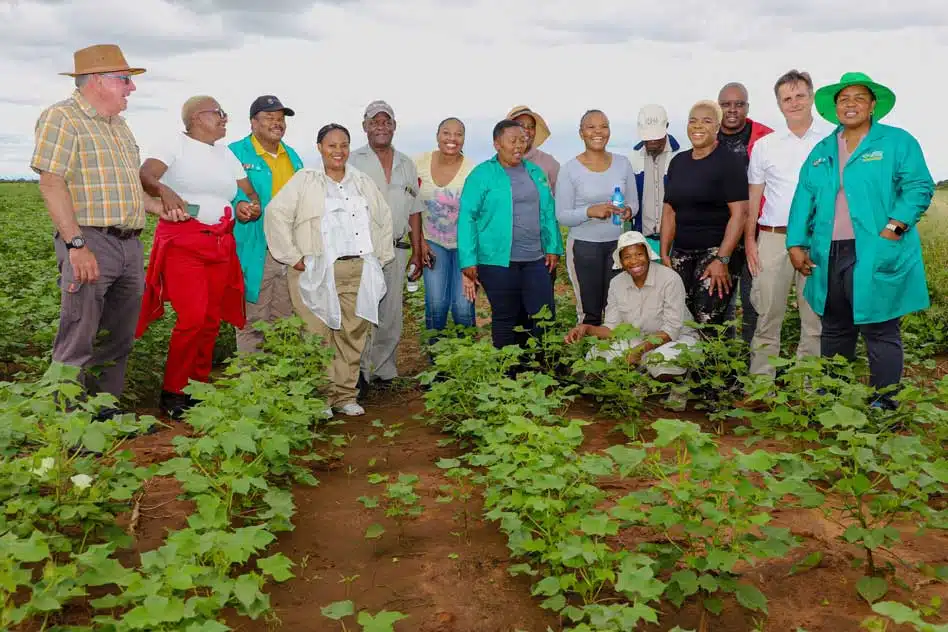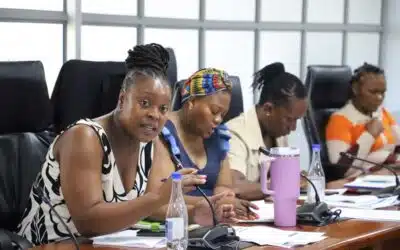The North West Provincial Legislature Portfolio Committee on Agriculture and Rural Development, hosted by the Limpopo Portfolio Committee on Agriculture and Rural Development, successfully concluded a three-day benchmarking study tour at the Limpopo Provincial Legislature. The tour, which commenced on 18 February 2025 and is set to conclude on 21 February 2025, focused on the innovation and industrialisation of cotton and citrus agro-processing in Limpopo.
The North West Committee identified Limpopo as a key catalyst in transferring best practices, noting that the 2024 Citrus Growing Association annual report ranked Limpopo as the highest citrus producer (40%), followed by the Eastern Cape (25%), Western Cape (19%), and Mpumalanga (7%). This benchmarking initiative is in line with the National Development Plan (NDP), which underscores the potential of commercial agriculture to drive job creation.
Hon Tebogo Modise, Acting Chairperson of the North West Legislature Committee on Agriculture, remarked:
“This was a necessary exercise to partake in as part of the NDP forges the maximization of job creation in South Africa. North West province, with an unemployment rate of 52% as per Statistics SA, stands to benefit from the economic potential in the agricultural sector
“We will also have a greater understanding of how to impact departmental planning and policymaking to ensure that the budget, based on these measures, will successfully contribute to employment and provincial GDP once approved, said Hon Modise.”
During the tour, the North West Committee, in collaboration with the Limpopo Agriculture Committee led by Chairperson Hon Constance Kupa and senior officials from the Limpopo Department of Agriculture and Rural Development, visited two pivotal sites:
• Majeje Citrus Farm: A key project under the Department of Agriculture, Land Reform and Rural Development (DALRRD), the farm currently employs over 110 direct jobs. It excels in exporting high-quality citrus while efficiently utilising non-exportable produce to minimise waste.
• Swara o tiise Molemi Primary Agricultural Cooperative: Located in Matlererekeng village within the Ephraim Mogale Municipality, this cotton-producing cooperative is noteworthy for its 100% female ownership and for employing over 160 workers inclusive of EPWP workers provided by the department. The cooperative, which occupies 300 hectares (with 169 hectares under cotton cultivation), operates on long-term land permission from local tribal authorities and supplies cotton fibre to Great North Ginnery servicing markets in Toitskraal Marble Hall.
Hon Priscilla Williams of the North West Agriculture Committee highlighted the multi-billion project at Majeje Citrus Farm, noting the effective collaboration among private and public sectors, community stakeholders, and traditional leaders. “It is uncommon to find a project partly funded by government that sustains itself through stakeholder contributions. This model is very encouraging compared to projects that rely solely on government funding,” stated Hon Williams.
Hon Karabo Magagane also commended the achievements at the Swara o tiise Molemi Primary Agricultural Cooperative. “It is very exciting to note that a 100% female-owned cotton production enterprise is not only challenging a traditionally white male-dominated sector but is also making significant strides in reducing unemployment,” said Hon Magagane.
The committee appreciated the knowledge exchange from this study tour, recognising its potential to create a robust value chain that fosters sustainable work opportunities. The innovations in both cotton and citrus agro-processing are expected to contribute to job creation, enhance provincial GDP, and stimulate related industries—ranging from textiles to food and cosmetics—thereby reinforcing the pillars of sustainable economic growth.
Related Posts
Portfolio Committee on Community Safety and Transport Management Welcomes Appointment of New BRP at NTI
The Portfolio Committee on Community Safety and Transport Management, led by...
On Friday, 28 March 2025, the North West Provincial Legislature held a wellness program for its employees. The program focused on integrated employee health and wellness issues.
Presentations were made on the following topics: HIV & AIDS and TB Management,...
North West Legislature Portfolio Committee Demands Immediate Suspension of North West Housing Corporation CEO and Halt to Mega and Smart City Projects amid Forensic Probe
The North West Legislature Portfolio Committee on Cooperative Governance,...




